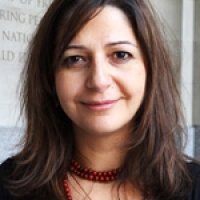Who Leads the Arab World?
A group of Wilson Center scholars discussed regional players in the Arab world and the domestic and international challenges they face in maintaining their influence in the rest of the Middle East.
On November 30, the Middle East Program hosted a meeting, “Who Leads the Arab World?” with Robin Wright, USIP-Wilson Center Distinguished Scholar; David Ottaway, Senior Scholar, Woodrow Wilson Center; and Hanin Ghaddar, Public Policy Scholar, Woodrow Wilson Center and Managing Editor, NOW News, Lebanon. Haleh Esfandiari, Wilson Center Middle East Program director, moderated the event. Jane Harman, Director, President, and CEO of the Wilson Center, gave welcoming remarks.
Opening the discussion, Jane Harman commented on her recent visit to Egypt during which she witnessed debates over the new constitution. Feeling there is “inadequate political capacity in Egypt,” she suggested a move away from protests toward negotiation, which would provide the new government the legitimacy of consensus. Harman further expressed hope in a “stunning vision” of a Middle East built on brokering peace and pooling intellectual capital, as well as confidence that Egypt’s new President Mohamed Morsi has the potential to be a significant player in Israeli-Palestinian negotiations.
David Ottaway identified four broader “geopolitical regions” in the Middle East— the Gulf, the Levant, the Israel-Egypt corridor, and the Maghreb—each of which has its own players who have little influence outside their own spheres. These regions primarily face the issues of Iranian influence, Syrian civil war, peace talks, and security in Northern Mali, respectively. Ottaway focused on the Gulf sphere, in particular the ways in which Saudi Arabia is “trying to assert its leadership.” He identified three ways in which Saudi initiatives have recently failed regarding the GCC: not being able to come to an agreement over a common currency, not getting Jordan and Morocco to join the GCC, and not being able to form “unity” among members. These examples show that Saudi Arabia’s “ability to exercise its influence even over its neighbors has been very limited.” Ottaway posited that Saudi Arabia has more regional influence through its support of Salafi movements, although he noted that this influence has been checked by the growing popularity of the Muslim Brotherhood as an alternative approach to Islamist politics. Ottaway also stated that Saudi influence is limited by such domestic issues as an aging monarchy and an unresolved succession issue.
Robin Wright, asserting that “no one can overestimate the importance of Egypt,” discussed political trends since the parliamentary and presidential elections this year. She emphasized the significance of the “new phase” of Egyptian political Islam, particularly the “very rich diversity” of movements and the “vast internal rifts” within these movements. Wright saw this diversity as a new foundation for democracy, noting that Islam and democracy are increasingly interactive and interdependent in Arab politics. Wright also discussed the unexpected rise of President Mohamed Morsi from unknown engineering professor to the most influential leader in the Arab world in a matter of weeks. She noted his “realistic” approaches to relations with Israel, his attempt to crackdown on extremism in the Sinai, and negotiations with the IMF over objections from ultraconservative Salafi parties. Despite praising Morsi’s concern for “human-centered laws,” Wright felt that his recent declaration of increased executive authority was a “colossal mistake” that was part of a “gradual erosion of the spirit of democracy” that may only serve to unite fractured opposition forces. Wright concluded with a detailed analysis of the final draft of the new constitution, arguing that the discussions about the document are often “more contentious” than the content itself. She argued that although the draft is “imperfect”—“all constitutions are” —it does more than previous documents to address some rights and may “set the tone on these critical issues” in the Arab world.
Turning to a discussion of Qatar, Hanin Ghaddar analyzed the Gulf country’s efforts to expand its influence in the Middle East. She described Qatar’s foreign policy since the onset of the Arab Spring as a shift “from soft power to hard power.” Whereas Qatar had once cultivated ties with Iran and other regional players in an attempt to build up a “peacebroker role,” now it is “taking a stand” based on pragmatic visions of the future. For instance, in Syria, Qatar decided to build ties with Arab Spring “winners” by supporting Islamist rebels, ignoring its previous diplomatic ties with Damascus. Ghaddar asserted that Qatar is attempting to fill the void left by the declining influence of Saudi, Iranian, and Western actors in the region. However, she felt that this approach was only a “short term strategy.” As an example, Ghaddar mentioned how many Syrian rebels disguise themselves as Salafis in order to gain Qatari funding; what Qatar thinks will be loyal factions in a new Syria may instead ignore these ties once they no longer need Qatari support. Other Qatari policies might limit its long-term influence as well, such as the monarchist stance of Al-Jazeera’s Arabic coverage and issue of Qatari domestic repression, as exemplified by a recent case of a poet jailed for life for insulting the emir. Unless Qatar addresses such issues, Ghaddar said, it “might not be able to sustain its influence,” and the long-term effects of its policies, for example regarding Islamism, “could be dangerous” for the Middle East as a whole.
By Laura Rostad, Middle East Program
Speakers


Former Washington Post Middle East Correspondent

Inaugural Friedmann Visiting Fellow, Washington Institute for Near East Policy
Hosted By

Middle East Program
The Wilson Center’s Middle East Program serves as a crucial resource for the policymaking community and beyond, providing analyses and research that helps inform US foreign policymaking, stimulates public debate, and expands knowledge about issues in the wider Middle East and North Africa (MENA) region. Read more
